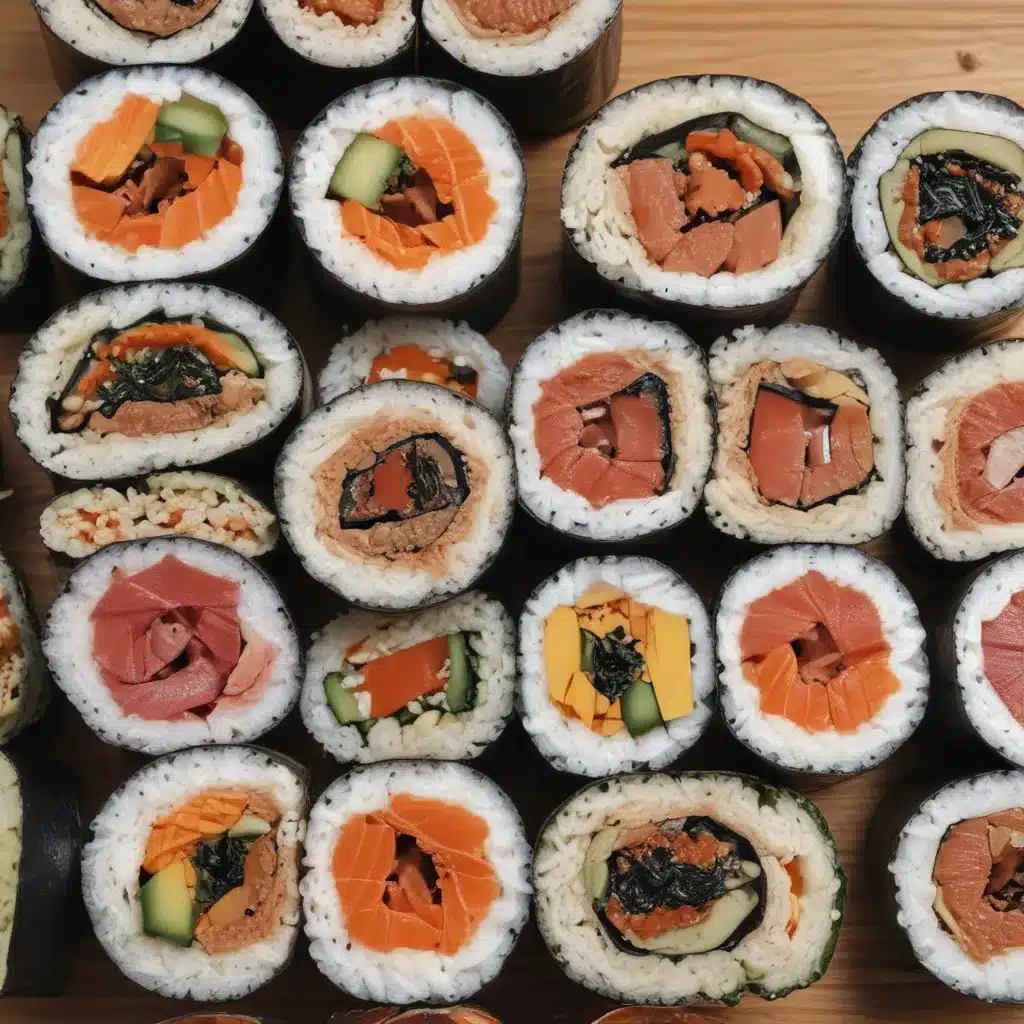
The Curious Case of the Frozen Kimbap Craze
I’ll never forget the day I stumbled upon that viral Reddit thread about the Trader Joe’s frozen kimbap fiasco. It was like watching a real-life reenactment of the Cabbage Patch Kid hysteria of the ’80s, but for Korean sushi enthusiasts. Apparently, these little rolls of seaweed-wrapped rice and veggies had become the hottest commodity at the popular grocery chain, leaving customers in absolute despair as they were sold out time and time again.
As a self-proclaimed kimbap connoisseur, I couldn’t help but chuckle at the reactions. “I should have bought a few when I had the chance!” one Redditor lamented, their anguish palpable even through the screen. Another user hilariously dubbed the situation the “Mega Sized Maki Sushi Roll Debacle,” speculating that Trader Joe’s may have gotten some “complaints” about the oversized rolls.
But you know what they say – one person’s tragedy is another’s opportunity. That’s when the wheels in my head started turning. If the demand for these Korean-inspired sushi rolls was this high, surely there was a gap in the market that needed to be filled. And who better to take on that challenge than yours truly, a self-proclaimed kimbap expert with a deep appreciation for the fusion of Korean and Japanese culinary traditions?
The Evolution of Kimbap: From Seoul to Sushi
Kimbap, often referred to as “Korean sushi,” has a rich history that’s deeply intertwined with the cultural identity of the Korean peninsula. Dating back to the 19th century, this portable, hand-rolled delicacy was initially a necessity for rural workers and travelers, providing a hearty and convenient source of sustenance. Unlike its Japanese counterpart, traditional kimbap features a variety of fillings, from seasoned beef and pickled radish to spinach and tuna, all neatly wrapped in a sheet of dried seaweed.
Over the years, as Korean cuisine gained global recognition, kimbap has undergone a remarkable transformation. No longer confined to the Korean diaspora, this versatile food has found its way into the hearts and stomachs of sushi enthusiasts around the world. And it’s not just the classic kimbap that’s captivating taste buds – innovative chefs have been pushing the boundaries, fusing the essence of Korean flavors with the artistry of Japanese sushi-making.
Korean Garden Boston, the premier Korean cuisine destination in the heart of Beantown, has been at the forefront of this culinary revolution. Helmed by a team of passionate culinarians, the restaurant has become a hub for the reinvention of kimbap, offering a tantalizing array of sushi-inspired creations that seamlessly blend the distinct profiles of both cultures.
Kimbap Goes Gourmet: The Korean Garden Boston Experience
Step into Korean Garden Boston, and you’ll be transported to a world where the boundaries between Korean and Japanese cuisine blur. The menu, a veritable playground for the senses, features an array of kimbap rolls that challenge the very notion of what a sushi roll should be.
Take, for instance, the “Bulgogi Bae” – a magnificent creation that pays homage to the beloved Korean beef dish. Succulent strips of marinated beef, paired with crisp veggies and a drizzle of bulgogi-inspired sauce, are wrapped in a bed of perfectly seasoned sushi rice, all enveloped in a sheet of nori. The result is a harmonious fusion of flavors and textures that will have your taste buds doing the dance of joy.
But the culinary wizardry at Korean Garden Boston doesn’t stop there. The “Spicy Tuna Kimbap” takes the classic spicy tuna roll and gives it a Korean twist, with the addition of gochujang (Korean red pepper paste) and a sprinkle of toasted sesame seeds. The “Kimchi Kimbap” is a tantalizing homage to the beloved Korean fermented cabbage, featuring a vibrant medley of pickled veggies and a tangy kick that will have you reaching for more.
And let’s not forget the “Kimbap Crunch,” a delightful creation that pays tribute to the beloved Korean street food snack, the kimbap triangle. Layers of crispy tempura, creamy avocado, and spicy tuna are wrapped in a fluffy sushi rice blanket, creating a harmonious balance of flavors and textures that will have you questioning the very nature of sushi.
| Kimbap Roll | Ingredients | Flavor Profile |
|---|---|---|
| Bulgogi Bae | Marinated beef, crisp veggies, bulgogi sauce | Savory, sweet, with a hint of spice |
| Spicy Tuna Kimbap | Spicy tuna, gochujang, toasted sesame seeds | Fiery, aromatic, with a touch of nutty sweetness |
| Kimchi Kimbap | Pickled veggies, fermented cabbage | Tangy, crunchy, with a subtle heat |
| Kimbap Crunch | Crispy tempura, creamy avocado, spicy tuna | Crispy, creamy, with a spicy kick |
The culinary artists at Korean Garden Boston have truly taken the concept of kimbap and elevated it to new gastronomic heights. Their unwavering commitment to honoring Korean culinary traditions while playfully incorporating sushi-inspired elements has resulted in a menu that is both familiar and innovative, captivating the palates of both seasoned kimbap enthusiasts and sushi aficionados alike.
The Future of Kimbap: Pushing the Boundaries of Fusion Cuisine
As I sit here, savoring the last bite of my “Kimbap Crunch,” I can’t help but wonder – where will the evolution of kimbap take us next? Will we see the incorporation of even more unexpected ingredients, like the much-debated idea of adding bacon to sushi rolls that was explored on the Sushi Reddit?
One thing is certain – the team at Korean Garden Boston is not one to rest on their laurels. They are constantly pushing the boundaries of fusion cuisine, blending the bold flavors of Korean gastronomy with the delicate artistry of Japanese sushi-making. And with the growing demand for innovative and adventurous culinary experiences, I have no doubt that the future of kimbap will be as bright and exciting as the present.
So, the next time you find yourself craving a taste of Korea, with a twist of Japan, make your way to Korean Garden Boston. Who knows – you might just stumble upon the next kimbap revolution, one delicious roll at a time.
